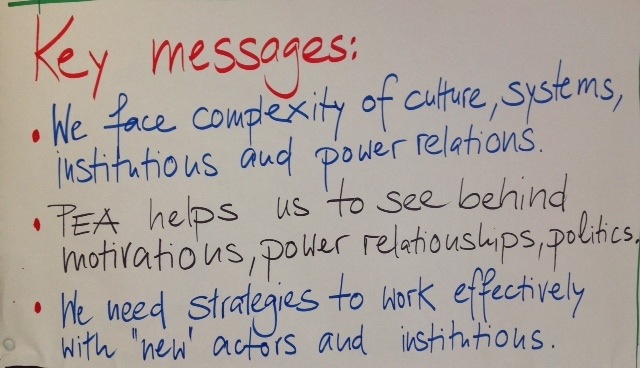Table of contents
After focusing on context related issues during the first day, the 2nd day addresses aspects related to the drafting of governance strategies. The first morning session presents the findings of the learning project on “citizens’ participation & accountability: what is good practice and what needs to change?”.
The second morning input introduces the political economy analysis (PEA) and the power analysis. In the afternoon, the theory is tested in practice when four SDC offices talk about their experience in using PEA. The final input of the day talks about key issues in quality assurance. – Finally, something for your eye: VIDEO/PHOTO IMPRESSIONS & TWEETS.
The morning kicks off with the findings from eight case studies on participation and accountability in local governance processes and the resulting recommendations. The study is asking questions such as:
- Why do projects / programs hesitate to work with political actors? What are the risks and challenges of working with them?
- Do projects address visible, hidden and invisible powers in the analysis of the context and of stakeholders? With which tools?
In the video, Celestine Kroesschel provides us with a short summary of the findings.
You can download all documents on the learning project here.
How can we move things and produce more impact with our support? Conclusions from this sessions:
- We accept complexity – complexity of systems, culture, values, actors etc. – and deal with the complexity of situations we are working in.
- We work with different actors. We have some experiences how to work with actors as politicians, parliamentarians, political parties etc. However, SDC is not pushing the reflection on support strategies tailor-made for these “new” actors. The GOVNET for instance has launched capitalisation processes; we want to learn from them.
- So far, the discussion shows that many network members are interested in the question of political actors. But we still have little exchange within our network on this issue. This could be a new learning issue for the network?
You can download the flip charts in PDF format here.

“We are not responsible for change, BUT we are accountable for change! Mind Political Economy!”
Zolzaya, SCO Mongolia
Political Economy was the key topic for the second day. Bridging the context discussion on democratization and reforms to a more analytical perspective combined with concrete tools for the translation into our programs and projects in the field.
Andrés Mejía Acosta and Jethro Pettit from IDS Brighton started the day with conclusions of the research work of the last months referring to the concrete experiences with Political Economy Analysis in the countries of the Western Balkan.
In summary, IDS emphasized that the purpose of political economy and power analyses is to explain power relations and political dynamics in the formulation, adoption and implementation of development initiatives. To understand the formal rules and informal practices that shape their behaviour in a given context, to analyse formal and informal mechanisms to ensure cooperation over time and to discuss theories of change involved and the existing or alternative narratives justifying development interventions. Participants noted the further need to clarify the theoretical approaches and models and to continue the discussions in the network on Political Economy. The video explains in short one way we can differentiate between political economy analysis and power analysis.
Based on the experiences of design and application of a Political Economy Analysis the National Program Officers of the Western Balkan countries outlined their experiences and challenges and underlined the value added of Political Economy analysis for the planning of new programs and country strategies.
To link the experiences and more theoretical models of political economy analysis and instruments like power analysis, stakeholder analysis and drivers of change, the afternoon was reserved for group discussions and the translation into our practice. Key questions were:
- What are the key learnings from the process in the Western Balkan but and other Political Economy Analysis that have been conducted?
- How do we translate these findings into our processes, in particular the Country Strategy processes?
- Where are the challenges, downsides….?
Key messages have been summarized as follows…

The day was closed with the offer of an open space, Stefan Hochhuth, consultant for Political Economy for SDC, on insights and backgrounds on the value added of Political Economy Analysis. The following presentation gives a short and excellent summary of the discussion. You can download the power point presentation here.
